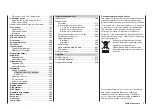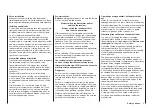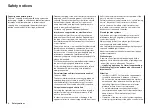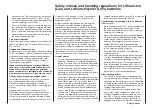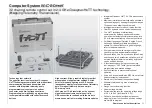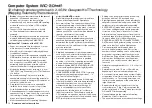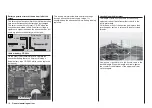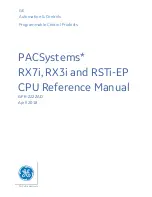
4
Safety notices
In order to enjoy your modeling hobby for a long time,
please read these instructions thoroughly and give
particular attention to the safety notices. You should
also register right away at
https://www.graupner.de/
de/service/produktregistrierung.aspx
since this is
the only way for you to automatically receive current
information about your product via email.
If you are a beginner with remote controlled model
aircraft, ships or cars, you should really ask an
experienced model pilot for assistance.
If this remote control system changes ownership,
these instructions should surely be included with
remote control system.
Intended usage
This remote control system may only be used for the
purpose intended by the manufacturer, i.e. for the
operation of
unmanned remote controlled models
.
Any other usage is not permissible.
Safety notices
SAFETY IS NO ACCIDENT
and
REMOTE CONTROLLED MODELS ARE NOT TOYS
… because even small models can cause substantial
property damage and/or personal injuries if they are
not handled properly - even if caused by third parties.
Technical defects of an electrical or mechanical
nature can lead to unexpected startup of a motor and/
or parts being hurled through the air to pose a danger
of injury to you and to others.
Short circuit conditions are to be avoided absolutely!
A short circuit condition may not only destroy parts
of the remote control system but, depending on
the circumstances and the battery energy involved,
may also pose acute danger of incineration or even
explosion.
All motor-driven parts, such as aircraft or ship
propellers, helicopter rotors, open gearboxes etc.
represent a constant danger. Contact with these parts
must be avoided. A rapidly turning aircraft propeller
can, for example, sever a fi nger. Also pay attention
that other objects do not come into contact with
driven parts.
When a drive battery is connected or a motor is
running:
never
get into the danger zone of driving
mechanisms.
Be sure to pay attention that motors do not start
up unintentionally while performing programming
operations. Disconnect the fuel supply or battery
terminals to motors before programming.
Protect all units from dust, dirt, moisture and other
foreign parts. Never expose these units to vibrations
or excessive hot or cold temperatures. Remote
control operation may only be performed under
"normal" outdoor temperatures, i.e. within a range of
-15 °C to +55 °C.
Avoid mechanical jarring and pressure stresses.
Always check units for damage to housings and
cables. Do not use units which have been damaged
or become wet, even after they are dry again.
Only those components and accessories which
we recommend may be used. Always use original
Graupner
plug and jack connectors which are made
for one another out of the same materials.
When routing cables, pay attention that they are
not stressed, unduly kinked or broken. The sharp
edges of adjacent parts also represent a hazard for
insulated conductors.
Be sure that all plug and jack connections are fi rmly
seated. Do not pull on the cable to disconnect a
plugged connector.
No modifi cations whatsoever may be made to units.
Modifi cations will void the operating permit and all
insurance protection.
Installing the receiver
The receiver is to be installed with a cushion of foam
rubber to afford protection against jarring; in aircraft
models behind a strong rib, for a car or ship model
the location must be protected against dust and
spray water.
The receiver may not be mounted in direct contact
with the hull or chassis as this would allow motor
vibrations and/or roadway jarring to be transferred
directly to the receiver. When a receiver system is
installed in a model with a combustion motor, all
receiver parts should always be protected against the
intrusion of exhaust gases and oil residue. Above all,
this applies to the model's ON/OFF switch, which is
typically built into the model's outer surface.
Position the receiver such that connecting cables to
the servos and the power supply are routed with a
bit of slack and that the receiver's antenna is at least
5 cm away from any large metal parts or wiring except
for other receiver wires/cables. In addition to steel,
this also includes carbon fi ber parts, servos, electric
motors, fuel pumps and all sorts of cables, etc.
Optimally the receiver should be placed at a readily
accessible location that is well away from all other
equipment. Under no circumstances may a servo
cable be wrapped around the antenna or routed close
to it.
Make sure that cables near the antenna cannot move
about during fl ight.
Routing the receiver's antenna
The receiver and its antennas must be positioned
as far away as possible from drives of any kind. If
the model's hull is made of carbon fi ber material, the
ends of the antennas must extend outside of the hull.
The orientation of antennas is not critical.
Nevertheless, a vertical (upright) installation of receiver
antennas is advantageous. In the case of diversity
antennas (two antennas), the second antenna should
be oriented at a 90° angle to the fi rst antenna.
Safety notices
Be sure to pay attention!
Содержание 32032
Страница 1: ...33020 mc 20HoTT 2 en Programming Manual o Pro Pro mc 20 mc 20...
Страница 15: ...15 For your notes...
Страница 21: ......
Страница 27: ...27 For your notes...
Страница 41: ...41 For your notes...
Страница 53: ...53 For your notes...
Страница 59: ...59 For your notes...
Страница 63: ...63 For your notes...
Страница 93: ...93 For your notes...
Страница 97: ...97 For your notes...
Страница 141: ...141 How is a ight phase programmed...
Страница 145: ...145 For your notes...
Страница 155: ...155 For your notes...
Страница 175: ...175 For your notes...
Страница 203: ...203 For your notes...
Страница 219: ...219 For your notes...
Страница 253: ...253 For your notes...
Страница 283: ...283 For your notes...
Страница 321: ...321 For your notes...
Страница 322: ...322 For your notes...
Страница 323: ...323 For your notes...



